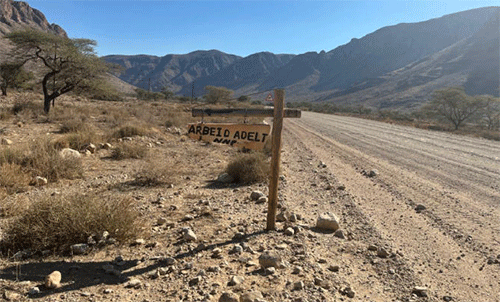MALTAHÖHE – The Maltahöhe community has expressed concern over the recent concession awarded for the Farm Arbeit Campsite. The concession also includes a related shuttle service in the Namib Naukluft National Park.
In a letter dated 20 November 2024 and addressed to the executive director of the environment ministry, representatives from the Witbooi Traditional Authority and local leaders expressed discontent over what they described as a lack of adequate consultation during the concession process.
“We believe the principles of communal rights and participatory governance are fundamental to sustainable resources’ management,” the community leaders stated.
The letter originated from Corinna van Wyk of the Legal Assistance Centre (LAC), who is representing the concerned community. The concerned project site is in the Namib Naukluft National Park, Maltahohe district in the Hardap region.
It entails a campsite where people can camp when on vacation, usually with restrooms and facilities for bathing, while the shuttle service is a transport service operating over a short route, documents showed.
The community argued that the decision to award the concession in their area was made without their involvement, which not only undermines their traditional governance structures, but also disregards their rights to engage with and benefit from local resources. The community is seeking clarification on the criteria used to select the concessionaire, emphasising that the absence of community consultations promotes a lack of transparency, and can lead to mistrust between communities and the government.
They are particularly concerned about how this oversight may affect their relationship with governmental bodies, and the management of their natural resources. Moreover, there are concerns regarding the environmental implications of the concession.
“We urge the ministry to consider the sustainable practices advocated by our communities in any future dealings regarding this site,” they said, highlighting that the awarded concession could have significant impacts on biodiversity and environmental sustainability in the region.
The 2007 Policy on Tourism and Wildlife Concessions on State Land states that it is mandated that the process of awarding concessions must be fair and transparent, empowering communities to negotiate agreements which benefit them directly.
The Maltahöhe community is calling for detailed information about the concession process to ensure compliance with these predetermined principles.
Detailed questions sent to the environment ministry have thus far gone unanswered.
According to a recent Environmental Impact Assessment (EIA) dated June 2024, the project is expected to generate waste during both construction and operational phases, which poses a notable environmental challenge for the area. Additionally, there are anticipated impacts on vegetation and biodiversity due to land-clearing activities.
The assessment outlines potential health and safety risks associated with the construction and operational phases, as well as possible adverse effects on the surface.
“Most of the impacts identified can be addressed through the recommended mitigation and management actions,” the report stated. On a more positive note, the project is expected to enhance the livelihoods of the local community in the Maltahohe district. The EIA highlights that the project is generally expected to contribute to improving the livelihoods of the local community through employment opportunities and increased tourism services.
This suggests that while there are environmental concerns, there are also social benefits anticipated.
Public participation has been a key component of this process, with interested parties notified through site notices and newspaper advertisements. However, community leaders have voiced concern about their exclusion from meaningful engagement in this process, saying only specific individuals were part of the consultation processes.


